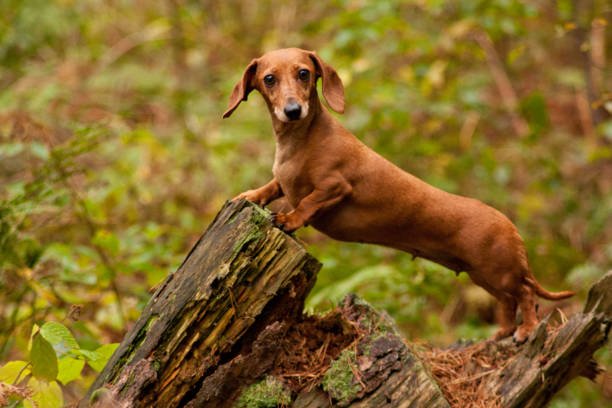The Dachshund: A Spirited and Distinctive Canine Companion
The Dachshund, with its distinctive elongated body and lively personality, is a breed that has charmed dog lovers for centuries. Known for its unique appearance, intelligence, and courageous spirit, the Dachshund has earned a special place in the hearts of families and individuals around the world. In this exploration, we delve into the history, characteristics, and the endearing qualities that define the Dachshund.
Origin and History
The Dachshund’s roots can be traced back to Germany, where the breed was developed in the early 17th century. The name “Dachshund” translates to “badger dog” in German, reflecting the breed’s original purpose as a hunting dog specialized in pursuing burrow-dwelling animals such as badgers. The Dachshund’s elongated body and short legs were well-suited for navigating tight spaces and burrows.
Over time, the Dachshund’s versatility and tenacity in hunting made it a popular choice for various game, including rabbits and foxes. The breed’s distinctive appearance and friendly demeanor also led to its emergence as a beloved family pet. Today, the Dachshund is cherished for its companionship, adaptability, and undeniable charm.
Physical Characteristics
The Dachshund is a small to medium-sized dog with a unique and elongated body, short legs, and a distinctive head shape. There are three coat varieties: smooth, long-haired, and wire-haired. The smooth coat is short and sleek, while the long-haired variety features soft, flowing hair, and the wire-haired coat is rough and dense. Dachshunds come in a variety of colors and patterns, including red, black and tan, chocolate and tan, and dapple.
The breed’s large, expressive eyes and long, drooping ears contribute to its endearing and alert expression. Despite its elongated body, the Dachshund is muscular and well-balanced, making it a surprisingly agile and energetic dog.
Temperament and Personality
Dachshunds are known for their lively and curious nature. They are often described as clever, tenacious, and sometimes even a bit stubborn. Their hunting instincts remain strong, and they may exhibit a strong prey drive, particularly when outdoors. Dachshunds are generally sociable and form strong bonds with their human family members, making them loyal and affectionate companions.
While they may be small in stature, Dachshunds often have a bold and fearless demeanor. This courage, coupled with their playful spirit, makes them a delightful addition to households seeking an active and spirited canine companion.
Intelligence and Trainability
Dachshunds are intelligent dogs with a keen sense of smell and a natural instinct for tracking. While their intelligence makes them quick learners, their independent nature can sometimes lead to a bit of stubbornness. Positive reinforcement training, consistency, and patience are key elements in successfully training a Dachshund.
Early socialization is crucial to ensure that Dachshunds develop well-mannered behavior around other dogs and people. Their alert nature makes them effective watchdogs, and their intelligence allows them to excel in various dog sports and activities.
Exercise Needs
Despite their small size, Dachshunds have moderate exercise requirements. Regular walks, playtime, and interactive activities help keep them physically and mentally stimulated. It’s important to monitor their weight and ensure they receive enough exercise to prevent obesity, a condition that can lead to health issues.
Dachshunds enjoy exploring their surroundings and may benefit from a secure outdoor area where they can safely investigate and play. As with any breed, mental stimulation is as important as physical exercise, so engaging in activities that challenge their minds helps prevent boredom and unwanted behaviors.
Grooming and Coat Care
The grooming needs of a Dachshund depend on its coat variety. Smooth-coated Dachshunds have low-maintenance coats that require regular brushing to remove loose hair. Long-haired Dachshunds benefit from more frequent brushing to prevent matting, while wire-haired Dachshunds may require hand-stripping or regular visits to a professional groomer to maintain their coat’s texture.
All Dachshunds benefit from regular dental care, nail trimming, and ear cleaning to ensure their overall health and comfort. Due to their unique body shape, maintaining a healthy weight is crucial to prevent strain on their backs.
Health Considerations
Dachshunds are generally healthy dogs, but their distinctive body shape can make them prone to certain health issues. One of the most common concerns is intervertebral disc disease (IVDD), a condition that affects the spine and can cause back pain or paralysis. To minimize the risk of IVDD, it’s important to provide appropriate support for the Dachshund’s back, such as using ramps instead of stairs.
Regular veterinary check-ups, a balanced diet, and maintaining a healthy weight contribute to the overall well-being of a Dachshund. Responsible breeding practices, including health screenings, help reduce the likelihood of genetic conditions.
Conclusion
In conclusion, the Dachshund is a spirited and distinctive breed that has charmed its way into the hearts of dog lovers around the world. From its origins as a tenacious badger hunter to its present-day role as a beloved family pet, the Dachshund embodies a unique combination of intelligence, playfulness, and loyalty.
Whether joining in on outdoor adventures, providing affectionate companionship, or showcasing their agility in dog sports, Dachshunds continue to leave a lasting impression. Their spirited personality and undeniable charm make them a cherished breed, proving that great things truly do come in small packages. The Dachshund stands as a testament to the joy and warmth that these delightful dogs bring to the lives of those fortunate enough to share their homes with them.







[…] important to monitor their weight and avoid overfeeding, as obesity can be a concern in the breed. Regular veterinary check-ups and a well-balanced diet […]